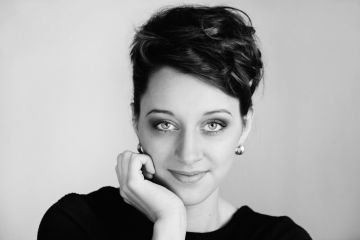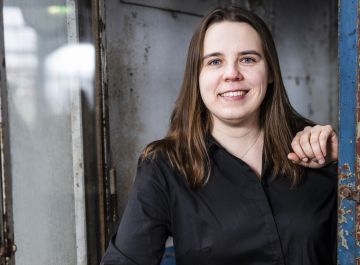
The young mezzo-soprano Esther Valentin studied at the University of Music and Dance Cologne in the classes of Mario Hoff and Ulrich Eisenlohr. Her vocal career began early with lessons from her father Michael Valentin, and later with the soprano Monica Pick-Hieronimi. In addition to her student training she received valuable musical impulses among others from Benjamin Appl, Graham Johnson, Brigitte Fassbaender, Thomas Quasthoff, Wolfram Rieger, Michael Gees, Ruth Ziesack, Stefan Irmer and Anne Le Bozec.
Esther Valentin won the first prize and the audience Award at the International Schubert Competition in Dortmund in September 2018 with the pianist Anastasia Grishutina. Also with Grishutina she was selected for the 2018 Bruno Frey Prize. This Summer the duo Valentin/Grishutina was selected by SWR2 for the three-year-long support program "SWR2 New Talent 2019“. She was a scholarship holder of the „Liedakademie des Heidelberger Frühling“. In 2019/20 she received scholarships for the Festival LiedBasel, as well for the Brentano-Academy Aschaffenburg with Julian Prégardien and Gerold Huber. In 2015 she and Rie Akamatsu won the first prize of the university-internal song competition of the HfMT Cologne as well as the festival Vocallis price in November 2016.
With Anastasia Grishutina, Valentin made recordings in November 2018 for a radio program with German and French songs at SWR Baden-Baden. There the duo also recorded their debut CD "Cupido's Games" in 2019. Also in 2019 she was a soloist on the first recording of cantatas by Antonio Salieri with the Heidelberger Sinfoniker under the direction of Timo Jouko Herrmann. In May 2017 she performed songs by Schubert and Eisler on a CD together with Rie Akamatsu on the fortepiano and the modern grand piano.
In addition to her opera and concert career as a freelance singer, Esther Valentin has been passionately dedicated to the art song for many years and regularly gives recitals. Her debut at the Philharmonie in Cologne was in October 2018 with a programme of songs of Schubert, Brahms and Wolf.

Anastasia Grishutina studied piano and historical instruments at the Moscow Conservatory with Slava Poprugin, Olga Filippova and Alexey Schevtchenko, then piano solo at the HMT Munich with Adrian Oetiker. She ist currently studying Lied interpretation at the HfMT Cologne with Ulrich Eisenlohr und Stefan Irmer. At numerous masterclasses she has received inspiration from Michael Gees, Christoph Prégadien, Benjamin Appl, Graham Johnson, Anne Le Bozec, Jan Philip Schulze, Ruth Ziesak, Alexey Liubimov, Dirk Mommertz and Bart van Ort.
Since October 2019 she has been teaching Lied interpretation for singers at the HfMT Cologne.
In November 2016 she was awarded the accompanists’ prize at the Brigitte-Kempen-Competition in Aachen. In 2017 together with the Baritone Woongsu Kim she won the 2nd Prize at the ISLD in Groningen. In August 2018 Anastasia Grishutina and the mezzo-soprano Esther Valentin were awarded the Bruno-Frey-Prize. In September 2018 the Duo won the 1st prize and the audience prize at the International Schubert-Competition in Dortmund. Anastasia Grishutina also won the special prize for the best Lied pianist. This Summer the duo Valentin/Grishutina was selected by SWR2 for the three-year-long support program "SWR2 New Talent 2019".
Anastasia Grishutina has performed in the Foyer of the Dutch National Oper & Ballett Amsterdam, at the Kölner Philharmonie and at numerous festivals, including the “Festival Klavier“ at the Brucknerhaus Linz, the "Peter de Grote Festival", “Antiqua Musica Nova” in Groningen and the “Schubert-Fest” in Dortmund. In 2019 she was awarded a scholarship to attend the Festival LIEDBasel. She has been invited to the first Brenatno-Akademie in Aschaffenburg in 2020.
In November 2018 she and Esther Valentin made a radio recording at SWR2 in Baden-Baden of selected french and german songs. In 2019 they recorded a CD entitled “Cupido’s Games” as a co-production with SWR2 and GWK-Records.
Anastasia Grishutina has a particular interest in making Russian Lied repertoire more accessible to European audiences.

